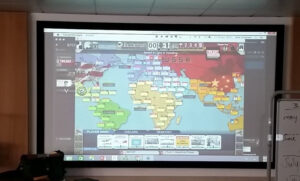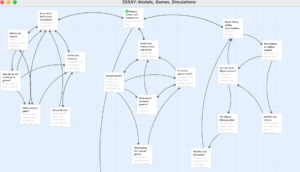I’m teaching a new course on Serious Games for the undergraduates this semester. I’ve taught games at undergrad level previously, but changes in the landscape of gaming knowledge among students means I must/can change the approach.
I’ve taught games at undergrad level previously: wargame design as an assignment in War, State & Society, politics sims in Post War British Politics and Model UN sims in International Organisations. But for the past few years since we set up a BA in Digital Humanities my undergrad teaching has focused on personal learning environments, and my game modules have been at Masters level.

Getting back to undergrad games teaching isn’t simply a case of dusting off old stuff and tweaking it a bit. Packaging a dozen years of game design as assessment teaching into a single undergrad module is hard! Obviously I have so much accumulated content which won’t all fit so there will have to do some serious uncoverage. On the student side, knowledge of games has shifted. Livestreams of Tabletop Roleplaying games are now very common, which means it’s much easier to explain TTRPGS and Crisis Games now. There are also top class streams of boardgames, and excellent mobile adaptations of great boardgames which are relatively cheap. People know a lot more about games outside of the AAA console world. If I need to explain mechanics for a card driven game like Twilight Struggle, I can just mirror my iPad to the big screen and demo it.

I have also had fun working with students outside my own Digital Humanities classes. I have had an opportunity to build some branching path games using Twine with students in a postgrad course in BioAnalytics. The course has strong industry links, and several firms have written case studies which we are converting to games for use in the course, as well as having student write case studies some of which may become games. It is fascinating to see the variety of methods different groups within the same discipline use to create case studies, and to see the common epistemological frameworks across the cases. I’ve used Twine essays as an assignment mode in some courses for a few years; I’m pretty sure we can use it for undergrad game design exercises.
All of this opens new possibilities for my own teaching, but they have to be balanced with what can reasonably be covered in a semester. So less merry chuntering along with the history of game development since the Kreigspeil, only a mere mention of narratology v ludology, less MDA and less Hero’s Journey (but those readings will still be available for students who want to download and keep them for future reference), more focus on systems thinking and systemic game design, and narratives. Also, we’ll use the Matrix Games methodology, and then Matrix Games with probabilities as a way to build from ideas about a case study to putting hard numbers on an issue. That’s particularly important, because one of the challenges at the heart of Digital Humanities is translating human experience into digital data; and game design as assessment in learning is a good place to make that happen.
But now I have to go and knock out a slidedeck to cover what I consider the basic lead in materials more concisely than in previous years. Might have to dig out that book I started writing years ago and finish it…
Leave a Reply